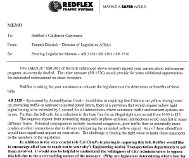Article from: www.thenewspaper.com/news/38/3870.asp
8/16/2012
California: Redflex Wrote Changes to Red Light Camera Legislation
Red light camera company authored changes to pending red light camera legislation in California.
 The California Assembly's Appropriations Committee on Monday amended Senate Bill 1303, dropping pro-motorist provisions on behalf of red light camera companies and local municipalities. State Senator Joe Simitian (D-Palo Alto) initially proposed the legislation at the suggestion of a constituent to make the existing photo enforcement statute more motorist friendly. Internal documents show Redflex Traffic Systems, an Australian red light camera vendor, not a constituent, is behind the legislation's latest iteration.
The California Assembly's Appropriations Committee on Monday amended Senate Bill 1303, dropping pro-motorist provisions on behalf of red light camera companies and local municipalities. State Senator Joe Simitian (D-Palo Alto) initially proposed the legislation at the suggestion of a constituent to make the existing photo enforcement statute more motorist friendly. Internal documents show Redflex Traffic Systems, an Australian red light camera vendor, not a constituent, is behind the legislation's latest iteration.
The first drafts of Simitian's bill would have modified the rules for posting signs at camera intersections and would have standardized the form for "snitch tickets" which are issued to vehicle drivers when the red light camera photos do not clearly show the driver's face. Redflex and other vendors send out official-looking notices in the hopes of tricking drivers into thinking they have no choice but to pay the $500 fine, even though California law states that tickets may only be issued to a clearly identified driver. Simitian proposed adding a "none of the above" checkbox to the courtesy notice to make it clear drivers are under no legal obligation to respond to the notice or pay the citation. Simitian's recent changes dropped the checkbox and added language changing the California rules of evidence so that red light cameras would be safe from legal challenge under hearsay rules. These modifications were not made on behalf of any constituent, but to protect Redflex from a pending California Supreme Court case.
"Earlier this month, our lobbyist met with the senator's staff and representatives from the AOC to discuss codifying a standard TVN (or courtesy notice) form," a Redflex memo distributed to Southern California cities in April explained. "In addition, Redflex has suggested amending the bill to seek to confirm and codify existing law, as set forth in People v. Goldsmith, and to further clarify that any discussion in People v. Borzakian to the contrary is superseded by the statute. Both of these suggested amendments were provided to the senator at his request and with his acknowledgment of a desire to reach a compromise. No agreement has been reached and although hopeful, true results remain to be seen."
As of August 13, those results have been achieved in full. Redflex discussed Simitian's bill and another, more urgent matter in an April 13 conference call with representatives from the cities of Corona, El Cajon, Oceanside, Riverside, Santa Ana and San Diego County. The discussion centered on separate "legislation for reduced fines for rights on red and lengthening amber phases... which, if passed, would have a negative impact on your photo enforcement program." At the time, Redflex was concerned Assembly Bill 2128 could gather momentum. It would have required yellow timing to be set according to the actual, prevailing speed of traffic at an intersection to ensure drivers have sufficient time to stop without getting a ticket. It also would have reduced the rolling right-turn red light camera fine from $500 to $200.
"Please invite/forward this to your command staff and city traffic engineers," Redflex account representative Keith Underwood wrote in an email to the city representatives. "We would like as many upper level folks on this call as possible! ...A draft letter of opposition to the specific bills will be made available, should customers be willing to weigh in on this matter of serious concern."
The yellow time bill failed, but the call participants received their wish in wholly re-writing Simitian's photo ticketing bill to meet the requirements of Redflex. Simitian's bill passed the state Senate unanimously in May and would become law if adopted by the Assembly and signed by Governor Jerry Brown (D).
 The California Assembly's Appropriations Committee on Monday amended Senate Bill 1303, dropping pro-motorist provisions on behalf of red light camera companies and local municipalities. State Senator Joe Simitian (D-Palo Alto) initially proposed the legislation at the suggestion of a constituent to make the existing photo enforcement statute more motorist friendly. Internal documents show Redflex Traffic Systems, an Australian red light camera vendor, not a constituent, is behind the legislation's latest iteration.
The California Assembly's Appropriations Committee on Monday amended Senate Bill 1303, dropping pro-motorist provisions on behalf of red light camera companies and local municipalities. State Senator Joe Simitian (D-Palo Alto) initially proposed the legislation at the suggestion of a constituent to make the existing photo enforcement statute more motorist friendly. Internal documents show Redflex Traffic Systems, an Australian red light camera vendor, not a constituent, is behind the legislation's latest iteration.